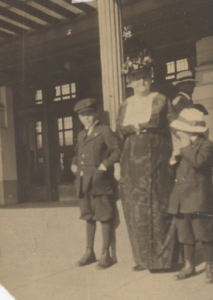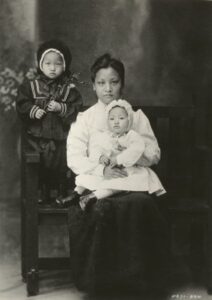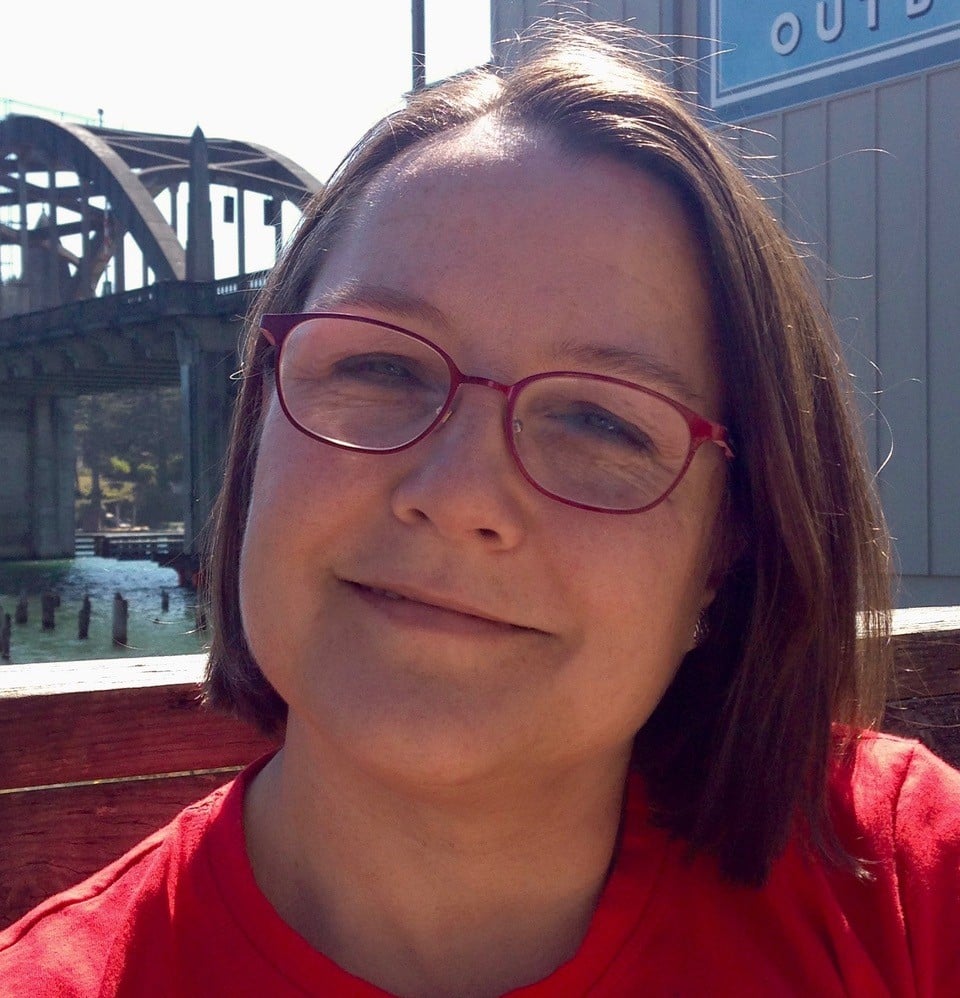I already knew that Aurelia was a strong woman. She gave birth to her second daughter while traveling by wagon train from Hopkins County, Texas, to Southern California. According to the recently shared newspaper clippings, she usually drove the wagon’s team while her husband attended to other duties … but I guess even she had to take a break from that during the baby’s delivery!
Around the time of my great-grandmother’s birth in March 1878, Aurelia and John Thomas Bottoms divorced. Given that timing, one might suspect adultery as the cause, but the number of DNA matches I share with John’s maternal Rushing and paternal Bottoms relatives tend to disprove that theory. In my gut, I’ve always suspected that Aurelia initiated the divorce, but it’s only a hunch.
 Aurelia J. Corker, 16 July 1916, with her Athearn grandsons Folger (left) and Leigh. Used with permission from the Durand Family Archives
Aurelia J. Corker, 16 July 1916, with her Athearn grandsons Folger (left) and Leigh. Used with permission from the Durand Family Archives
Aurelia went on to marry a divorced native of Ireland in 1886, who was 35 years her senior! The marriage was not a success, and on 9 October 1888 she and John R. Corker entered into a legal agreement of separation, in which she retained the real estate she had brought to the marriage (which Mr. Corker had tried to claim was community property). Less than a year after their separation, John R. Corker died, and his will, dated 12 December 1883, was filed with the probate court by Mr. Corker’s son. Aurelia filed a protest, claiming that the will had been revoked by her marriage to Mr. Corker. After various objections by John’s son, the judge gave Aurelia her rights as John Corker’s widow, including his military pension.
Aurelia’s determination and grit were passed on to her daughters. Kate, the baby born in the overland wagon train, became the first graduate – male or female – of Healdsburg College (now Pacific Union College) in 1889. Eleven years later, her youngest daughter, Purle, graduated from the University of California. Both young women became high school teachers. Valuing education as she did, it is no surprise that Aurelia ran for a position on the Los Angeles Board of Education in 1911; however, she was not successful.
 The future Hollywood actress Anna May Wong on her mother’s lap … around the time she would have met Aurelia J. Corker. Courtesy of Wisconsin Center for Film and Theater Research
The future Hollywood actress Anna May Wong on her mother’s lap … around the time she would have met Aurelia J. Corker. Courtesy of Wisconsin Center for Film and Theater Research
I have to confess that one of the newspaper clippings recently shared with me was perplexing. It was about a woman named Mary Rowe who objected to having a Chinese laundry next to her house on Flower Street. Eventually she prevailed on the local authorities to ban all such laundries in residential areas. I could see no connection with my family until I read Aurelia’s 1925 obituary. In it I learned that my great-great-grandmother willed a dozen of her Mexican-American tenants the houses in which they lived (and permission to move them), and allowed four years of free rent to Sam Wong, “father of Anna May Wong, motion-picture actress. Miss Wong often attributed her cinema success to inspiration from Mrs. Corker.” According to the early movie star’s sketch on Wikipedia, Anna May Wong[2] was born on Flower Street, and her father ran the Sam Kee Laundry. Scrapbook mystery solved!
Thanks to my great-great-grandmother exercising her right to vote, I learned another interesting thing. Based on several newspaper articles describing her activities, I was not at all surprised to see that voter registration records from 1916 and 1920 listed her as a member of the Socialist Party. I was surprised, however, that her occupation was listed as “mental physician.” I have no idea what sort of qualifications she had, or what professional activities she may have engaged in, but that was certainly something I had not expected to find. What do voter registration records say about your ancestresses?
Notes
[1] While she is only a very distant cousin, via the Nantucket knot of relatives, I was intrigued to discover that the very first woman to vote in America did so fifty years before the passage of the Nineteenth Amendment. Louisa Ann (Gardner) Swain (1801-1880) voted 6 September 1870 in Wyoming, when it was still a territory.
[2] Anna May Wong (AKA Wong Liu Tsong), 3 January 1905-3 February 1961, was a daughter of Wong Sam Sing and his second wife, Lee Gon Toy. Both of her parents were born in California to Chinese immigrants. The Wong family was enumerated living on Figueroa Street in Los Angeles (where Aurelia Corker owned two blocks) in the 1910, 1920, and 1930 censuses.
Share this:

About Pamela Athearn Filbert
Pamela Athearn Filbert was born in Berkeley, California, but considers herself a “native Oregonian born in exile,” since her maternal great-great-grandparents arrived via the Oregon Trail, and she herself moved to Oregon well before her second birthday. She met her husband (an actual native Oregonian whose parents lived two blocks from hers in Berkeley) in London, England. She holds a B.A. from the University of Oregon, and has worked as a newsletter and book editor in New York City and Salem, Oregon; she was most recently the college and career program coordinator at her local high school.View all posts by Pamela Athearn Filbert →